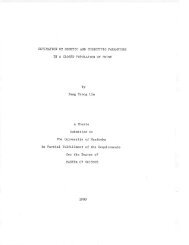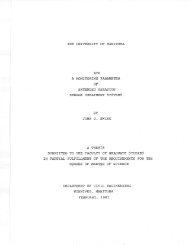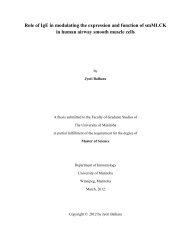Adverbial and Argument-Doubling Clauses in Cree - MSpace
Adverbial and Argument-Doubling Clauses in Cree - MSpace
Adverbial and Argument-Doubling Clauses in Cree - MSpace
You also want an ePaper? Increase the reach of your titles
YUMPU automatically turns print PDFs into web optimized ePapers that Google loves.
While doubl<strong>in</strong>g <strong>in</strong>volves CO-referentiality, the converse is not tnie. Not ail<br />
constituents which are CO-referential <strong>in</strong>volve a doubl<strong>in</strong>g relationship. This fact is<br />
important <strong>in</strong> light of the follow<strong>in</strong>g sentence (103).<br />
(1 03) John, snores when hei sleeps.<br />
If this sentence occurred <strong>in</strong> <strong>Cree</strong>, where 'John' <strong>and</strong> 'he' are CO-referentiai, we<br />
would not want to daim that they have a doubl<strong>in</strong>g relationship. Under the def<strong>in</strong>ition of<br />
doma<strong>in</strong> given above, a doubl<strong>in</strong>g relationship entails that both the mg <strong>and</strong> the doubl<strong>in</strong>g<br />
constituent form a s<strong>in</strong>gle doma<strong>in</strong>. We do not want to Say that the matk clause <strong>and</strong> the<br />
adverbial clause <strong>in</strong> (103) form a dorna<strong>in</strong> - <strong>in</strong>deed, the proposed analysis claims that a<br />
sentence conta<strong>in</strong><strong>in</strong>g an adverbial clause <strong>and</strong> matrix clause has two doma<strong>in</strong>s, one per<br />
clause. A <strong>Cree</strong> example is given <strong>in</strong> (104).<br />
(1 04) [, mayaw pro,-eh-kawisimot], [, sèmâk pro,-nipâw 1.<br />
as. soon-as cj-lie.down.AI-3 immediately sleep .AL3<br />
'As soon as hei lay dom, hei went to sleep. (P: 176-0 1)<br />
In (104), the subject argument <strong>in</strong> the subord<strong>in</strong>ate clause is CO-referential with the<br />
subjea argument <strong>in</strong> the matrix clause, they are both pro,. These arguments however, are<br />
not <strong>in</strong> a doubl<strong>in</strong>g relationship. Furthemore, we have already stated that adverbial clauses<br />
are not a part of the matrix doma<strong>in</strong>. Therefore, it is important to stress that a doma<strong>in</strong><br />
consists of a verb, its arguments, <strong>and</strong> any A-doubl<strong>in</strong>a constituents. Co-referentidity of<br />
arguments is not a sufficient requirement for the formation of a doma<strong>in</strong>. Thus, adverbial<br />
clauses, whether or not they have a referent <strong>in</strong> common with the matrk clause, are not A-



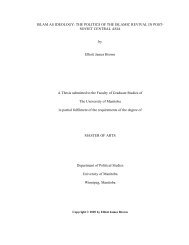
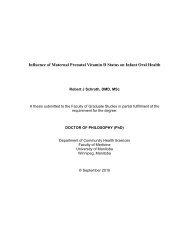
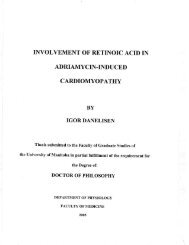
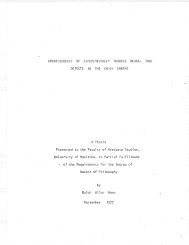
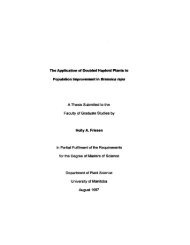
![an unusual bacterial isolate from in partial fulf]lment for the ... - MSpace](https://img.yumpu.com/21942008/1/190x245/an-unusual-bacterial-isolate-from-in-partial-fulflment-for-the-mspace.jpg?quality=85)
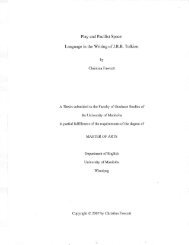
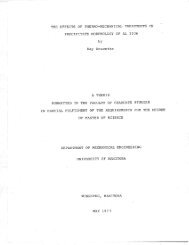
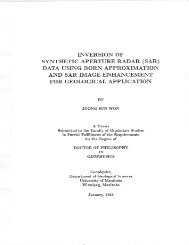
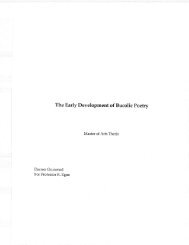
![in partial fulfil]ment of the - MSpace - University of Manitoba](https://img.yumpu.com/21941988/1/190x245/in-partial-fulfilment-of-the-mspace-university-of-manitoba.jpg?quality=85)
